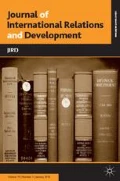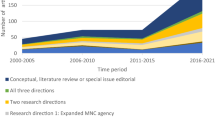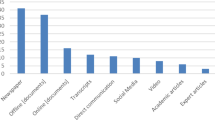Abstract
This article critically engages with the hierarchical binary between theory and area research in the study of international politics. We pose questions about the processes which construct and reaffirm the theory/area distinction in IR and show that the binary creates structural pressures and reinscribes hierarchies for individual scholars. We notice that IR’s Euro/West-centrism is directly linked to and perpetuated by the divide that privileges IR theorising over empirical research both on and from places outside of the West. We show how this divide has been institutionalised with the effect of producing separate but intertwined academic fields of ‘IR’ and ‘Area Studies’. The hitherto voiced calls to overcome the divide have largely focused on the question of how to give more weight to knowledge produced about the ‘non-West’ in IR. This, we argue, overlooks the broader significance of the theory/area divide, which lies in the socio-institutional structures maintaining it and the concrete effects they have on researchers from the ‘peripheries’. This article, therefore, aims to examine the construction of Area Studies’ peripherality and to rethink possible solutions. To better illustrate the intersection of epistemic politics and political economy of knowledge production, we highlight the experience of researchers from the Global East.
Similar content being viewed by others
Change history
02 December 2021
A Correction to this paper has been published: https://doi.org/10.1057/s41268-021-00250-y
Notes
These labels are problematic—cf. our discussion of the ‘global East’ below. In the context of this article, ‘non-West’ describes disciplinary attitudes to what Inanna Hamati-Ataya has called a ‘non-place’ without legitimacy to theorise from.
‘Within/Without: Strategies and possibilities for cultivating knowledge with the Global East’, BISA roundtable, June 2021.
As scholars move and their identities evolve, unambiguously defining who counts as a ‘researcher from the peripheries’ is impossible. However, without this category we are unable to shed light on inequalities in the discipline perceived by many of these researchers (if not always in individual cases).
Research was not guided only by political imperatives. Literary and historical Area Studies profited from geopolitically motivated funding. That said, IR-related Area Studies research was affected by geopolitical imperatives (Chow 2006).
In the interest of anonymity, we do not disclose our participants’ countries of origin. They also did not wish to reveal the countries on which they publish (which in most cases overlap). All research participants have undertaken part of their education in different sub-regions of the Global East (the Balkans, Central Asia, Central Europe), while doctoral and/or post-doctoral research has been undertaken in the UK.
IR is currently a popular subject for fee-paying students in the anglophone ‘core’, and in the UK much of the funding for employing academics in the field is derived from student fee income.
Review of International Studies webpage [online], available at www.cambridge.org/core/journals/review-of-international-studies (last accessed on 11 April, 2019).
Fieldwork, widely practiced in Area Studies, is not a standard research practice in IR, though it is gaining greater recognition (Bøås and Bliesemann de Guevara 2020). In contrast, in anthropology, extended excerpts from fieldwork notes often drive the narrative of a scholarly article.
Language issues have relegated countries like France and Germany to the academic ‘semi-periphery’ (Baber 2003).
E. g. last 3 years of publications in EJIR, RIS, Cambridge Review of International Affairs and International Theory (JIRD has a different publication pattern also because of its scope).
E. g. Eurasian Geography and Economics, Ab Imperio, Central Asian Survey. Several online journal are published within the Global East and also publish in Slavic languages. A new journal based at George Washington University aims to publish articles in Kazakh and Kyrgyz.
https://www.opendemocracy.net/en/odr/when-your-field-also-your-home-introducing-feminist-subjectivities-central-asia/ (last accessed on 20 May, 2021).
Thanks to Erica Marat for these suggestions.
Globalising Eastern Europe conference report, available at https://basees.org/news/2021/6/18/baseeseega-conference-report-globalising-eastern-europe-leipzig-20-24-april-2021 (last accessed on 25 June, 2021).
References
Aalbers, Manuel, and Ugo Rossi (2009) ‘Anglo-American/anglophone hegemony’, in Nigel Thrift and Rob Kitchin, eds, International encyclopedia of human geography, 116‒21, Amsterdam: Elsevier Science.
Acharya, Amitav, and Barry Buzan (2007) ‘Why is there no non-Western international relations theory? An introduction’, International Relations of the Asia-Pacific 7(3): 287‒312.
Acharya, Amitav (2014a) ‘Global international relations (IR) and regional worlds’, International Studies Quarterly 58(4): 647‒59.
Acharya, Amitav (2014b) ‘Global IR and Regional Worlds--Beyond Sahibs and Munshis: A New Agenda for International Studies’, Presidential Address to the 55th Annual Convention of the International Studies Association, Toronto.
Acharya, Amitav (2014c) Rethinking power, institutions and ideas in world politics: whose IR?, London: Routledge.
Agathangelou, Anna M. and Lily H. M. Ling (2004) ‘The house of IR: from family power politics to the poisies of worldism’, International Studies Review 6(4): 21‒49.
Agnew, John (2006) ‘Open to surprise?’, Progress in Human Geography 30(1): 1‒4.
Alatas, Syed Farid (2003) Academic dependency and the global division of labour in the social sciences. Current Sociology 51(6): 599–613.
Alejandro, Audrey (2018) Western Dominance in International Relations? The Internationalisation of IR in Brazil and India, Worlding Beyond the West, London: Routledge.
Altbach, Philip G. and Ulrich Teichler (2001) ‘Internationalization and exchanges in a globalized university’, Journal of Studies in International Education 5(1): 5‒25.
Ansems de Vries, L., L. M. Coleman, D. Rosenow, M. Tazzioli and R. Vázquez (2017) ‘Collective discussion: Fracturing politics (or, how to avoid the tacit reproduction of modern/colonial ontologies in critical thought)’, International Political Sociology 11(1): 90‒108.
Aris, Stephen (2020) ‘International vs. area? The disciplinary-politics of knowledge-exchange between IR and Area Studies’, International Theory advance online publication: 1‒32, https://doi.org/10.1017/S1752971920000184
Aydinli, Ersel and J. Mathews (2000) ‘Are the core and periphery irreconcilable? The curious world of publishing in contemporary international relations’, International Studies Perspectives 1(3): 289‒303.
Baber, Zaheer (2003) ‘Provincial universalism: The landscape of knowledge production in an era of globalization’, Current Sociology 51(6): 615‒23.
Behr, Hartmut (2020) ‘Theory vs. ideology’, in Benjamin Martill and Sebastian Schindler, eds, Theory as Ideology in International Relations. The Politics of Knowledge, 19‒33, London: Routledge.
Bilgin, Pinar (2016) ‘How to remedy Eurocentrism in IR? A complement and a challenge for The Global Transformation’, International Theory 8(3): 492‒501.
Bilgin, Pinar (2017) The International in Security, Security in the International, London: Routledge.
Bøås, Morten and Berit Bliesemann de Guevara (2020) Doing Fieldwork in Areas of International Intervention: A Guide to Research in Violent and Closed Contexts, Bristol: Policy Press.
Bonnell, Victoria E. and George Breslauer (2002) ‘Soviet and Post-Soviet Area Studies’, in David L. Szanton, ed., The Politics of Knowledge: Area Studies and the Disciplines, 31–62, Oakland: University of California Press.
Burlyuk, Olga (2019) ‘Fending off a triple inferiority complex in academia: an autoethnography’, Journal of Narrative Politics 6(1): 28‒50.
Chan, Stephen (2001) ‘Seven Types of Ambiguity in Western International Relations Theory and Painful Steps Towards Right Ethics’, in Stephen Chan, Peter Mandaville and Roland Bleicker, eds, The Zen of International Relations – IR Theory from East to West, 69-78, New York: Palgrave Macmillan.
Chankseliani, Maia (2018) ‘Four rationales of HE internationalization: Perspectives of UK universities on attracting students from former Soviet countries’, Journal of Studies in International Education 22(1): 53‒70.
Chari, Sharad, Verdery, K (2009) Thinking between the posts: Postcolonialism, postsocialism, and ethnography after the Cold War. Comparative Studies in Society and History 51(1): 6–34.
Chow, Rey (2006) The Age of the World Target, Durham, NC; London: Duke University Press.
Connell, R. W. (1997) ‘Why is classical theory classical?’, American Journal of Sociology 102(6): 1511‒57.
Connell, Raewyn (2019) Canons and colonies: the global trajectory of sociology. Estudos Históricos (Rio de Janeiro) 32: 349–367.
De Eguia Huerta, Maria (2020) ‘Knowledge Decolonization à la Grounded Theory: Control Juggling in Research Situations’, Social Epistemology 34(4): 370‒81.
Demeter, Martón (2019) The world-systemic dynamics of knowledge production: The distribution of transnational academic capital in the social sciences. Journal of World-Systems Research 25(1): 112–144.
Dyvik, Synne L., Jan Selby and R. Wilkinson, eds (2017) What’s the point of international relations?, London: Taylor & Francis.
Hamati-Ataya, Inanna (2018) ‘Crafting the reflexive gaze: knowledge of knowledge in the Social Worlds of International Relations’, in Andreas Gofas, Inanna Hamati-Ataya and Nicholas Onuf, eds, The SAGE handbook of the history, philosophy and sociology of international relations, 13-30, London: SAGE.
Hamati-Ataya, Inanna (2012) ‘IR theory as international practice/agency: A clinical-cynical Bourdieusian perspective’, Millennium 40(3): 625‒46.
Hamati-Ataya, Inanna (2013) ‘Reflectivity, reflexivity, reflexivism: IR’s ‘reflexive turn’—and beyond.’ European Journal of International Relations 19 (4):669-94.
Hanson, Stephen E. (2009) ‘The Contribution of Area Studies’, in T. Landman and N. Robinson, eds, The SAGE Handbook of Comparative Politics, 159-174, London: SAGE Publications Ltd.
Haraway, Donna (1988) ‘Situated Knowledges: The Science Question in Feminism and the Privilege of Partial Perspective’, Feminist Studies 14(3): 575–99.
Hurrell, Andrew (2020) ‘Why International Relations and Area Studies Need Each Other’, St Antony’s International Review 16(1): 22‒27.
Jehlička, Petr (2021) ‘Eastern Europe and the geography of knowledge production: The case of the invisible gardener’, Progress in Human Geography advance online article DOI: 0309132520987305.
Kaczmarska, Katarzyna (2020a) Making Global Knowledge in Local Contexts: The Politics of International Relations and Policy Advice in Russia, London and New York: Routledge.
Kaczmarska, Katarzyna (2020b) ‘Theory, ideology and IR’s quest for scientific credibility’, in Benjamin Martill and Sebastian Schindler, eds, Theory as Ideology in International Relations. The Politics of Knowledge, 51‒71, Routledge.
Kamola, Isaac (2013) ‘Why global? Diagnosing the globalization literature within a political economy of higher education’, International Political Sociology 7(1): 41‒58.
Klinke, Ian (2015) ‘Area studies, geography and the study of Europe’s East’, Geographical Journal 181(4): 423‒26.
Koomen, Jonneke (2019) ‘International relations/black internationalism: Reimagining teaching and learning about global politics’, International Studies Perspectives 20(4): 390‒411.
Krishna, Sankaran (1993) ‘Race, Amnesia and Education of International Relations’, Alternatives 26: 401–24.
Kristensen, Peter Marcus (2015) ‘Revisiting the “American Social Science” ‒ Mapping the Geography of International Relations’, International Studies Perspectives 16(3): 246–69.
Kuus, Merje (2004) ‘Europe’s Eastern Expansion and the Reinscription of Otherness in East-Central Europe’, Progress in Human Geography 28(4): 472–89.
Lai, Daniela (2021) ‘Stranci: Political Research and Language Learning in the Former Yugoslavia’, in Branislav Radeljić and Carlos González-Villa, eds, Researching Yugoslavia and its Aftermath: Sources, Prejudices and Alternative Solutions, 89‒107, Cham: Springer International Publishing.
Ludden, David (2000) ‘Area studies in the age of globalization’, FRONTIERS: The Interdisciplinary Journal of Area Studies Abroad 6: 1–22.
Marat, Erica and Zhibek Aisharina (2021) ‘Towards a more equal research field in Central Asian studies’, OpenDemocracy, available at https://www.opendemocracy.net/en/odr/towards-more-equal-field-central-asia-research/ (last accessed on 10 May, 2021).
Matos-Ala, Jacqueline de (2018) ‘Making the invisible, visible: challenging the knowledge structures inherent in International Relations Theory in order to create knowledge plural curricula’, Revista Brasileira de Política Internacional 60: 1-18.
Mbembe, Achille (2016) ‘Decolonizing the university: New directions’, Arts and Humanities in Higher Education 15(1): 29‒45.
Mitchell, Timothy (2003) ‘The Middle East in the Past and Future of Social Science’, in David L. Szanton, ed., The Politics of Knowledge: Area Studies and the Disciplines, 31–62, Oakland: University of California Press.
Miyoshi, Masao and Harry Harootunian (2002) ‘Introduction’, in Masao Miyoshi, Harry Harootunian and Rey Chow, eds, Learning places: The afterlives of area studies, 1-18, Durham, NC; London: Duke University Press.
Müller, Martin (2020) ‘In search of the Global East: Thinking between north and south’, Geopolitics 25(3): 734‒55.
Mwambari, D. (2019) ‘Local positionality in the production of knowledge in Northern Uganda’, International Journal of Qualitative Methods 18: 1-12.
Parvulescu, Anca (2019) ‘Eastern Europe as Method’, Slavic and East European Journal 63(4): 470-481.
Raj, Kapil (2013) Beyond postcolonialism… and postpositivism: circulation and the global history of science. Isis 104(2): 337–347.
Rathbun, Brian (2017) ‘Empirical Evidence for Empirical International Relations Theorizing: Tests of Epistemological Assumptions With Data’, Oxford Research Encyclopedia of Politics [retrieved 11.08.2021], available at: https://oxfordre.com/politics/view/https://doi.org/10.1093/acrefore/9780190228637.001.0001/acrefore-9780190228637-e-519
Reus-Smit, Christian (2018) On cultural diversity: international theory in a world of difference, London: Cambridge University Press.
Shadymanova, Jarkyn, Sarah Amsler (2018) Institutional strategies of higher education reform in Post-Soviet Kyrgyzstan: differentiating to survive between state and market. 25 years of transformations of higher education systems in post-soviet countries. Palgrave Macmillan, 229–257.
Shrivastava, Meenal and Sanjiv Shrivastava (2014) ‘Political economy of higher education: comparing South Africa to trends in the world’, Higher Education 67(6): 809‒22.
Sidaway, James. D. (2013) ‘Geography, globalization, and the problematic of area studies’, Annals of the Association of American Geographers 103(4): 984‒1002.
Song, Xinning (2001) ‘Building international relations theory with Chinese characteristics’, Journal of Contemporary China 10(26): 61‒74.
Sukarieh, M. and S. Tannock (2019) ‘Subcontracting academia: alienation, exploitation and disillusionment in the UK overseas Syrian refugee research industry’, Antipode 51(2): 664‒80.
Sultanalieva, Syniat (2019) ‘How does it feel to be studied? A Central Asian perspective’, OpenDemocracy, available from https://www.opendemocracy.net/en/odr/how-does-it-feel-be-studied-central-asian-perspective/ (last accessed on 10 May, 2021).
Suyarkulova, Mohira (2019) ‘Becoming an activist scholar: Towards more politically engaged and socially accountable research practices in Central Asian Studies’, CESS Blog, available from http://thecessblog.com/author/mohira-suyarkulova/ (last accessed on 12 May, 2021).
Teti, Andrea (2007) ‘Bridging the gap: IR, Middle East studies and the disciplinary politics of the area studies controversy’, European Journal of International Relations 13(1): 117‒45.
Tickner, Arlene, and David L. Blaney (2013) Claiming the international, London: Routledge.
Tickner, Arlene, and Ole Wæver, eds (2009a) International relations scholarship around the world, London: Routledge.
Tickner, Arlene, and Ole Wæver (2009b) ‘Introduction. Geocultural epistemologies’, in Arlene Tickner and Ole Wæver, eds, International relations scholarship around the world, 1-31, London: Routledge.
Tickner, Arlene (2013) ‘Core, Periphery and (Neo)Imperialist International Relations’, European Journal of International Relations 19(3): 627–46.
Tickner, J. Ann (2015) ‘Revisiting IR in a time of crisis: Learning from indigenous knowledge’, International Feminist Journal of Politics 17(4): 536‒53.
Timár, Judit (2004) ‘More than “Anglo-American”, it is Western: hegemony in geography from a Hungarian perspective’, Geoforum 35(5): 533‒38.
Tlostanova, Madina (2010) Gender epistemologies and Eurasian borderlands, New York: Palgrave Macmillan.
Todorova, Maria (2005) The trap of backwardness: modernity, temporality, and the study of Eastern European nationalism. Slavic Review 64(1): 140–164.
Tolz, Vera (2011) Russia’s Own Orient: The Politics of Identity and Oriental Studies in the Late Imperial and Early Soviet Periods, Oxford: Oxford University Press.
Trubina, Elena, David Gogishvili, Nadja Imhof and Martin Müller (2020) ‘A part of the world or apart from the world? The postsocialist Global East in the geopolitics of knowledge’, Eurasian Geography and Economics 61(6): 636‒62.
Underhill, Geoffrey (2018) ‘European Journal of International Relations March issue: From the Editors’, European Journal of International Relations 24(1): 3‒7.
Valbjørn, Morten (2017a) ‘Dialoguing about Dialogues: On the Purpose, Procedure and Product of Dialogues in Inter-National Relations Theory’, International Studies Review 19(2): 291–96.
Valbjørn, Morten (2017b) ‘Strategies for reviving the international relations/Middle East Nexus after the Arab Uprisings’, PS: Political Science & Politics 50(3):647‒51.
Valbjørn, Morten (2004) ‘Toward a “mesopotamian turn”: Disciplinarity and the study of the international relations of the Middle East’, Journal of Mediterranean Studies 14(1): 47‒75.
Van der Ree, Gerard (2014) ‘Saving the discipline: Plurality, social capital, and the sociology of IR theorizing’, International Political Sociology 8(2): 218‒33.
Van Schendel, Willem (2002) ‘Geographies of Knowing, Geographies of Ignorance: Jumping Scale in Southeast Asia’, Environment and Planning D: Society and Space 20(6): 647–68.
Vitalis, Robert. 2016. White world order, black power politics. Cornell University Press.
Yoder, Brandon K. (2020) ‘Theoretical rigor and the study of contemporary cases: explaining post-cold war China–Russia relations’, International Politics 57(6): 741‒59.
Zhang, Yongjin and Teng-Chi Chang, eds (2016) Constructing a Chinese school of international relations: Ongoing debates and sociological realities, London: Routledge.
Acknowledgements
We would like to express gratitude to our interviewees and to Sarah Amsler, Asel Doolotkieva, Erica Marat and Kazu Kobayashi for discussions and comments that have helped to improve this article in numerous ways. We are also grateful to the editor of this special issue and the journal editors for their patience during the pandemic. Finally, thanks are due to the anonymous reviewers for constructive comments and literature suggestions.
Author information
Authors and Affiliations
Corresponding author
Additional information
Publisher's Note
Springer Nature remains neutral with regard to jurisdictional claims in published maps and institutional affiliations.
The original online version of this article was revised: In the original publication of the article, in the Abstract the phrase that reads as “socio-instructional structures” should read as “socio-institutional structures”.
Rights and permissions
About this article
Cite this article
Kaczmarska, K., Ortmann, S. IR theory and Area Studies: a plea for displaced knowledge about international politics. J Int Relat Dev 24, 820–847 (2021). https://doi.org/10.1057/s41268-021-00246-8
Published:
Issue Date:
DOI: https://doi.org/10.1057/s41268-021-00246-8




